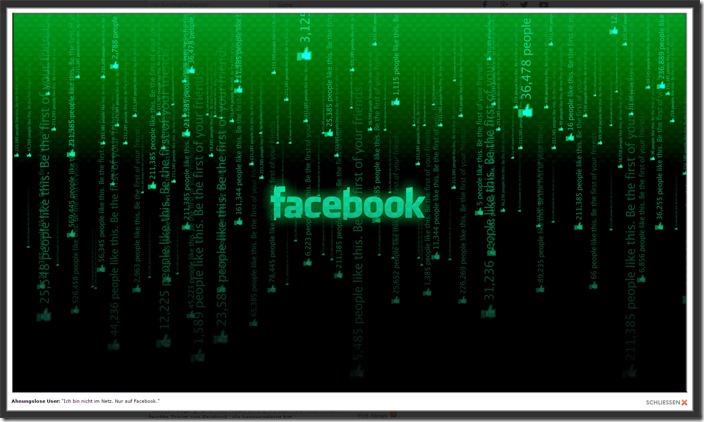Millions of Facebook users don't know they're on the internet. How can that be? Are they just too stupid for the internet or is it just ignorance?
A survey by the US news service Quartz in Indonesia and Nigeria, in which people were asked about their Internet behavior, brings to light a bizarre phenomenon: “A lot of people don't know the difference between Facebook and the rest of the Internet at all, for this People think Facebook is THE Internet.”

Among other things, the Quartz survey asked participants two questions about whether they had recently used the Internet and whether they had used Facebook. Of 500 participants each from Indonesia and Nigeria, eleven percent of those surveyed said that they used Facebook but NOT the Internet.
“Ie there is still a lot of clarification to be done outside of the western industrialized countries and the highly developed Asian countries.”
The perception of the Internet in emerging countries as well as in other developing countries is significantly different than in the Western world.
While Europeans and Americans have been using the Internet for years and social networks were recently added as one service among many, Facebook is THE INTERNET for many residents of emerging and developing countries.
Of course, Facebook is only too happy to let you believe this and there is a reason for that!
Internet access is unaffordable, especially for many people in poorer countries.
Elsewhere in the country there may be very poor internet connectivity or none at all. It is understandable that Facebook is more popular in such countries than the free web. For people, Facebook is not only the only point of contact for information, but also often their first contact with the Internet.
According to Facebook manager Sheryl Sandberg, many people get a smartphone, i.e. a phone with an Internet connection, just for Facebook. The reason for this is quickly found:
In certain countries, Facebook access is more easily accessible to users via the Internet.org initiative of the social network than the Internet per se. In addition, this access is also free or very cheap, in contrast to the rest of the world Webs. In many of these countries there are also Facebook flats or very cheap Facebook tariffs that cost a fraction of what the same providers charge for the free web.
Sounds like AOL back then
Through the merger of several technology companies such as Ericson, Samsung, Nokia, Facebook and a few more, it is possible that Facebook will be the cheapest Internet service in many developing countries and that people who have not yet had access to the Internet will have this as much as possible to be obtained cheaply. To achieve this, the partners rely on a clear mobile strategy and a special app.
The recently released Facebook Lite app runs stable even on less well-equipped smartphones, meaning that content via Facebook can be used even with a slow mobile phone connection.
It also filters data-intensive content in advance. There are no telephone or data plan costs for using the content within the app. This means: Facebook use is free. Google search is also included in the app's offerings.
This “all-round worry-free” package feels like the AOL installations of the 90s: everything was included. Chat, services, email. Back then, many people didn’t even know what a “browser” was.
Hidden pitfalls
So using the search is free. However, as soon as a user clicks on one of the search results, they leave the closed app space and data costs are incurred. According to the studies, this makes sense because only about half click on links that refer to content outside of Facebook.
We were also able to observe this phenomenon! Facebook users feel comfortable in their Facebook environment and are reluctant to leave it. This is also one reason why fraudsters often imitate Facebook pages: they want the user to feel comfortable.
Facebook's way of manipulation: artificially keeping people stupid?
These emerging and developing countries are an interesting market for Facebook and other companies such as Google. While saturation is already occurring in the major markets, you can still earn money in these countries. While Internet.org will indeed help provide millions of people with affordable access to mobile services, the project also ensures that they will become Facebook users first and possibly Web users later.
But as selfless as free internet access through these initiatives sounds, it is also questionable. Facebook lures people with a supposedly free offer. Facebook determines the content that these users see. This user community never sees the “free Internet”. At least that seems to be the plan.
Author: Marlene, mimikama.org
Notes:
1) This content reflects the current state of affairs at the time of publication. The reproduction of individual images, screenshots, embeds or video sequences serves to discuss the topic. 2) Individual contributions were created through the use of machine assistance and were carefully checked by the Mimikama editorial team before publication. ( Reason )

